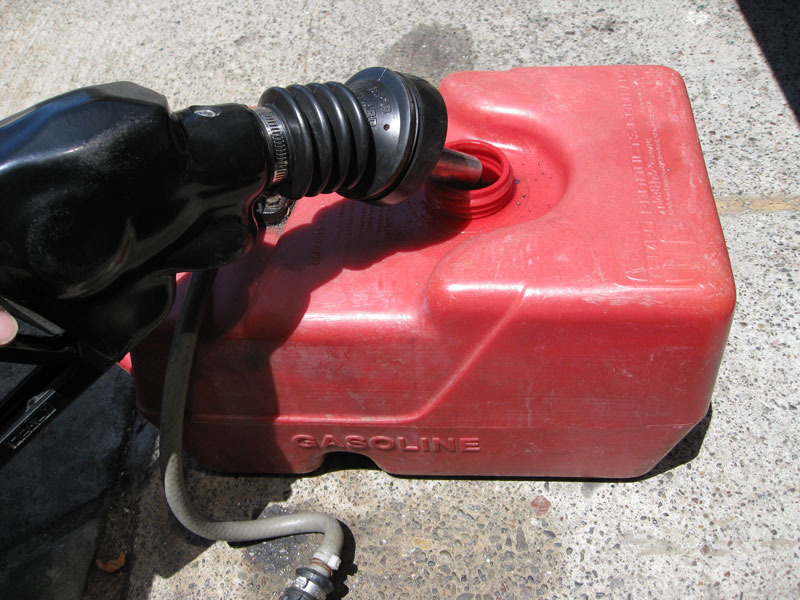
Gas-Using Boaters Beware
This item will be of particular interest to sailors who use gas-powered outboards as their primary source of auxiliary power or for their dinghy. Many of us use jerry cans to supply fuel to our outboards, and we stop at gas stations on our way to the marina to fill our jugs. The following call to action was sent to us by Chris Edmonston, Vice President Government Affairs, Boat Owners Association of The United States (BoatU.S.):
It’s the kick off to summer boating season, but thanks to President Trump’s recent announcement to allow the sale of E15 (15% ethanol) fuel year-round, some boats could be headed for the dry docks. Misfueling, reliability and safety issues, as well as environmental questions have recreational boaters concerned.
Most boat owners refuel their boat at a roadside gas station, not at a marina.

If you were to look at your local gas station’s fuel pump today to ensure you didn’t accidentally pump E15 fuel into your boat, the only warning label required on the station’s gas dispenser is an ineffectual, small, square orange label about the size of a pack of cards.
A 2016 Harris Poll found a concerning 64% of consumers were not sure or didn’t pay attention to the type of gas they used. Using E15 — even just a little bit — voids all boat engine manufacturer warranties. And unfortunately little effort is being made by the federal government to educate the public. Artificially expanding the market for E15 by allowing year-round sales could make it even more challenging for consumers to find preferred ethanol-free (E0) fuel and increase the risk of misfueling.
92% of those polled for a Boating Industry magazine survey in 2017 found ethanol-related issues on boat engines in their workshops. That’s a troubling statistic considering that the federal government already prohibits the use of fuel greater than E10, or 10% ethanol, in marine engines today.
And we’re not achieving environmental progress either with the President’s announcement. The reason that E15 is currently banned for sale by the Environmental Protection Agency during summer months is due to concerns that it contributes to smog on hot days. Ethanol-blended fuels also result in fewer miles per gallon, as ethanol has a third less energy content than gasoline, according to the Department of Energy.
The culprit behind ethanol-blended gasoline is the federal Renewable Fuel Standard (RFS) – an outdated, fundamentally broken policy that largely requires an ever-increasing amount of corn-based ethanol to be blended in the nation’s gasoline supply. Passed more than a decade ago, the RFS was intended to lower costs, help the environment, and reduce our dependence on foreign oil.
However the RFS wasn’t designed to factor in the possibility of reduced gasoline consumption — which is what we are seeing in America. The result is more ethanol has to go into less gas.
What we’ve come to learn is that the RFS is hurting — not helping — consumers. We’re concerned the President chose to give a handout to ethanol special interests, in the form of expanded E15 sales, rather than recognize that the RFS isn’t working for Americans or allow for other options.
Congress can still step in and take action by repealing the broken RFS and support other types of renewable fuels, such as biobutanol.
In the meantime, boaters beware and look before you pump.

Can’t you just write an article without your anti Trump comments? He is trying to make this country more energy independent …but you have to take your cheap shots….get your politics out of the article and leave it at home.
Abe
Abe — We’d like to think that we write 99% of our articles without any comments about the President. This article, written by the Vice President Government Affairs of the Boat Owners Association of The United States, made a reference to a policy decision by the current administration, and we’d think of this piece as an important policy discussion, as well as an article containing vitally important information for boaters. But admittedly, the reference to the President had a bit of snark to it. We don’t condone this particular tone, but if a writer had written the same article including “thanks to the Obama administration,” we would have published it.
In Latitude’s 41-year history, we’ve never been apolitical — we have strong opinions about energy policy and climate change, and we express them when we feel it’s appropriate — 99% of the time, that opinion is in responses to letters (or, now, website comments), and rarely in articles.
But we disagree that the President’s motives for his energy policy are purely driven toward independence. If that were the goal, the United States could be far more energy independent by investing in renewables. But what’s more, we always find it strange that a president whose popularity is based largely on his unfiltered “telling like it is” is so ardently shielded by his defenders. If “telling like it is” is indeed a laudable quality, shouldn’t we all respectfully do so? And in our own opinions (and again, outside of the vast majority of our articles), we respectfully disagree with a number of the President’s policies, especially those around energy and climate change. But we try to respect the administration and its supporters, because we don’t believe in tribalism. We believe in unity, and we hope that the President succeeds on behalf of the country, and on behalf of sailors.